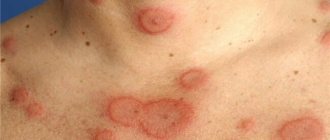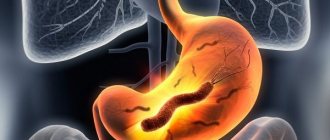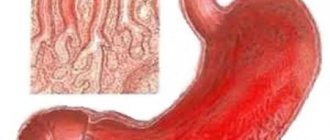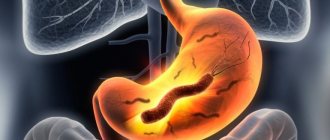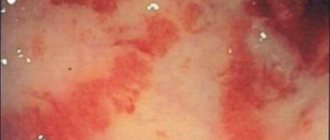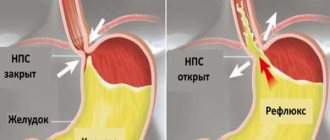Causes of atrophic gastroduodenitis
There are two main reasons leading to atrophy of the mucous membrane of the stomach and duodenum:
- An autoimmune process in which G cells of the secretory glands are damaged by their own immune antibodies;
- Long-term presence of the bacterium Helicobacter pylori in the gastrointestinal tract.
During the autoimmune process, antibodies mistake the cells of one's own secretory glands for foreign tissue. The acidity of gastric juice gradually decreases, and the parietal glands begin to produce mucus instead of hydrochloric acid. These processes lead to the impossibility of absorption of iron and vitamins by the walls of the stomach and duodenum, and the development of anemia. The addition of the Helicobacter bacterium accelerates the formation of areas of metaplasia.
The introduction of infection leads to cell damage, allowing free radicals to penetrate into them. The glands change their structure, their cells become precancerous. This is how intestinal metaplasia develops, when areas of the gastric mucosa acquire the properties of small intestinal and colonic epithelium. These transformations increase the likelihood of gastric adenocarcinoma.
Factors contributing to the development of the disease:
- Physical and mental stress;
- Hereditary predisposition to gastrointestinal diseases;
- Side effects of medications;
- Stress;
- Alcohol abuse;
- Occupational diseases;
- Somatic diseases in chronic form.
What it looks like, photo
With the development of atrophic gastroduodenitis, an extensive inflammatory process occurs, accompanied by disorders of the mucous membrane. Thus, the photo clearly shows that the cells of the glands involved in the secretion of digestive enzymes are replaced by connective tissue when damaged. As a result, the surface of the mucosa changes and its functioning is disrupted as a result of a decrease in the number of zymogenic cells. Due to insufficient gastric juice, food in the stomach ceases to undergo digestion processes.
Inflammation in the form of focal atrophic gastroduodenitis occurs in the lower part of the stomach on the left at the exit to the duodenum. The entrance to it is guarded by a gatekeeper, which is a ring of muscles. When the inflammatory process spreads, it stops working, and the contents from the intestines penetrate back into the stomach cavity, this action is called reflux. The enzymes it contains increase pH, which serves as a favorable environment for the existence of pathogenic microorganisms and bacteria. An acidic stomach should be a destructive barrier to harmful microflora, but reflux can disrupt these properties, allowing the penetration of dangerous microorganisms. Violation of digestive functions with the development of dysbiosis serve as a prerequisite for the development of carcinogenic transformations with the formation of tumors.
Symptoms of atrophic gastroduodenitis
The disease develops slowly, starting from the bottom of the stomach, gradually moving to other areas of the mucous membrane. Vivid symptoms of the disease may not manifest themselves at first, which creates obstacles to early diagnosis and timely treatment.
Signs of anemic syndrome resulting from impaired absorption of vitamins and iron:
- Weakness;
- Fast fatiguability;
- Drowsiness;
- Paleness of the skin and mucous membranes;
- Burning and pain in the tongue;
- Varnished tongue surface;
- Dry hair;
- Brittle nails;
- Stitching pains in the heart;
- Shortness of breath with any exertion.
Signs of dyspeptic syndrome associated with digestive disorders:
- Heaviness in the stomach;
- Aching pain in the projection of the epigastrium;
- Heartburn;
- Belching;
- Nausea;
- Vomiting of recently eaten food, mucus and bile;
- Decreased appetite;
- Alternating constipation and diarrhea;
- Bad breath and unpleasant taste in the mouth in the morning;
- Gray coating on the tongue, imprint of teeth on it.
Digestive disorders lead to a sharp decrease in body weight, and in advanced cases – to dystrophy. Obstacles to the absorption of vitamins cause decreased immunity, frequent colds and infectious diseases.
Gastritis and gastroduodenitis - differences
The differences are almost imperceptible. In the chronic course of the disease, the doctor is inclined towards gastroduodenitis. Although making a correct diagnosis is important so as not to waste time on treatment.
Relief of symptoms of gastritis occurs with the help of medications. The use of chemical drugs is ineffective for gastroduodenitis. Taking medications can cause duodenitis, expressed by nausea, vomiting, stool problems, etc.
Hemorrhagic gastritis is a severe form of inflammation of the gastrointestinal mucosa. This disease is characterized by damage to the upper layer of the stomach (its lining), which causes bleeding.
The inflammatory process does not spread to other parts of the stomach. This disease can be acute or chronic. An acute course occurs when the mucous membrane is damaged (mechanical or chemical).
Both gastritis and gastroduodenitis need to be treated in time, before the disease progresses; self-medication is inappropriate here.
Diagnostics
The most informative modern method for determining the form and stage of gastroduodenitis is a hematological diagnostic panel. This study helps to establish the degree of damage to the secretory glands and the level of metaplasia of the mucosal epithelium.
Parameters determined by the study:
- Gastrin level-17;
- Pepsinogen-1 and pepsinogen-2 levels;
- Histamine level-17;
- Indicator ratio.
Another informative study is FGDES with staining of the mucosa with methylene blue to assess the area of areas of epithelial metaplasia. During an endoscopic examination, a tissue biopsy of all altered areas of the mucous membrane is taken.
Additional methods for diagnosing atrophic gastritis:
- Gastrography;
- Intragastric pH-metry;
- Daily acidity measurement;
- MSCT (multispiral computed tomography) – if gastric cancer is suspected;
- Determination of the presence or absence of the bacterium Helicobacter pylori (breath test, ELISA test, PCR reaction).
What is the doctor looking for?
With atrophic gastroduodenitis, the mucous organs have a specific appearance: the diagnosis is made visually on the spot, using photographs or video recordings. The mucous membrane looks pale. Blood vessels are visible under the smooth relief (subatrophic gastroduodenitis). Atrophied mucous membrane is whitish, sometimes cyanotic in color.
There are no specific shapes or sizes. The doctor focuses on relief and transparency or changes in color. The name “atrophic” appeared against the background of severe dystrophy, observed visually. As research continued, the biological nature of the changes was established (see above).
Treatment of atrophic gastroduodenitis
The goal of treatment of atrophic gastroduodenitis is to prevent further development of intestinal metaplasia, destruction of the epithelium and its transformation into atypical cells (cancerous transformations). This goal can be achieved within 5 years of careful therapy.
A prerequisite for complete treatment is dietary nutrition. Food should be gentle in composition, temperature, and mechanical structure. After a short period of time, it is allowed to include low-concentrated lemon, cranberry, and cabbage juice in the diet. Bananas are the only acceptable fruit for this diet. Food should not be cold or hot, the diet should be frequent meals, small portions. Smoking and drinking alcohol in any dose are absolutely unacceptable during and after treatment.
Medicines for the treatment of atrophic gastroduodenitis:
- Antibiotics for eradication of the bacteria Helicobacter pylori;
- Proton pump inhibitors;
- Bismuth preparations;
- Glucocorticosteroids;
- Iron supplements;
- Vitamins;
- Enzymes;
- Mineral waters with high mineral content;
- Gastroprotectors;
- Antacids;
- Stimulators of cellular regeneration;
- Agents that stimulate peristalsis.
Additionally, physiotherapeutic treatment (electrophoresis, magnetotherapy, thermal procedures) and sanatorium treatment at a balneological resort are used.
Preventive measures
To avoid the occurrence of atrophic gastroduodenitis and maintain the digestive system in excellent condition, you must follow a number of simple rules:
- Eat healthy and nutritious meals regularly.
- Avoid fasting.
- Saturate the body with vitamins.
- Eat small meals at the same time.
- Avoid eating at night or before bedtime.
- Give up bad habits, especially smoking.
- Avoid too strict diets.
- Avoid stressful situations.
It is recommended to periodically use folk remedies for prevention - use infusions and decoctions.
Only regular examination by a gastroenterologist, a healthy lifestyle and good nutrition will ensure a favorable prognosis. Leaving the appearance of symptoms unattended, failure to follow the doctor’s recommendations and an incomplete course of treatment threatens the disease becoming a peptic ulcer, a significant deterioration in the general condition and serious complications.
Prevention and prognosis
To prevent atrophic gastroduodenitis, acute and chronic gastrointestinal diseases should be treated in a timely manner and the principles of rational nutrition should be followed. Early contact with a gastroenterologist and quality treatment will help prevent complications from occurring.
For elderly patients, the prognosis for the development of the disease is worse than for younger patients. At the age of over 50 years, mucosal atrophy most often ends in malignancy. If one course of treatment does not cure the disease, it should be repeated.
Author of the article:
Gorshenina Elena Ivanovna |
Gastroenterologist Education: Diploma in General Medicine received from the Russian State Medical University named after. N. I. Pirogova (2005). Postgraduate course in the specialty "Gastroenterology" - educational and scientific medical ]Our authors[/anchor]
Reviews
Dear readers, your opinion is very important to us - therefore, we will be glad to hear your feedback about atrophic gastroduodenitis in the comments, this will also be useful to other users of the site.
Alexandra
I was diagnosed with atrophic gastroduodenitis, when I began to become interested in this disease, I must admit, I was scared. Before this, I constantly suffered from heartburn, but I took soda or Gastal, and that’s how I was saved. But now, knowing how this could end, I began to follow a strict diet, and this alone saved me from many problems. I am undergoing a course of therapy, which was prescribed by the doctor; upon repeated examination, only the superficial form remained, but if treatment had been started earlier, I would have been able to recover completely.
Olga
I read that the erosive form of this disease cannot be treated, the main thing is to prevent the development of further changes. A strict diet is necessary and not to provoke exacerbations. Many people live like this, but it’s still scary, what if an ulcer forms or something worse—oncology.
About the reasons in detail
The cause of erythematous gastroduodenopathy is not always a diet disorder or an existing disease of the digestive system. The condition may have a different origin. The following factors provoke hyperemia of the mucous membrane:
- Microbial or fungal infections of the mucous membrane.
- Taking nonsteroidal anti-inflammatory medications. Hormones, anticoagulants for a long time.
- Chronic metabolic disorders.
- Vitamin deficiencies.
- Constant stress and overwork, high physical activity.
- Hereditary factor.
- Increased acidity of the stomach contents.
- Starvation diets.
- Bad habits.
At grade 1, gastroduodenopathy does not manifest itself sharply - clinical symptoms appear periodically and disappear as soon as the diet is normalized. Grade 2 erythematous gastroduodenopathy is characterized by a more pronounced clinical picture, which is similar to the manifestations of chronic gastritis.
